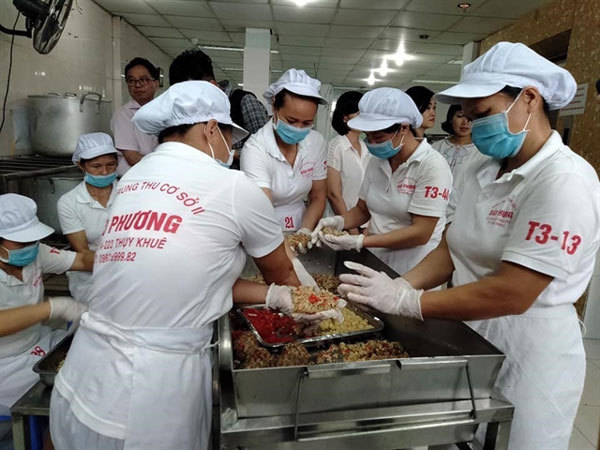 |
| Workers make mooncakes at Bao Phuong mooncake bakery in Hanoi’s Tay Ho District. The bakery is a renowned private mooncake brand in the city. VNA/VNS Photo Tuyet Mai |
But despite so many to choose from, with many made by hand in houses and factories around the country, it is still difficult for customers to know just how hygienic the ingredients are.
The Mid-Autumn Festival is a special time for Vietnamese – especially for children and families. Lanterns will light up the skies and of course, mooncakes will be in abundance.
Traditionally they are eaten on the 15th day of the eighth lunar month, often drank with tea, to worship ancestors and give thanks to relatives and business partners.
But how safe are they?
Many people sell their cakes online, using social media sites like Facebook or Zalo, but there are fears they may not meet required standards.
Nguyen Lan Dung, 26, a preschool teacher in Hanoi’s Thanh Xuan District, started making the cakes at home three years ago.
She found the ones available too sweet and wanted to add her own twist.
“At first, I made 50 cakes for my family and my friends,” she said.
“Their feedback was positive encouraged me to make them on sale.”
Her prices may not have been that competitive, selling a single 150g cake for VND50,000, but she was confident in her ingredients.
Most of the materials she bought at nearby minimarts, Dung said, adding that she didn’t trust the quality of those unlicensed products.
Nguyen Dac Loc, deputy head of Ha Noi Market Watch, said households selling handmade moon cakes must abide by the regulations on quality, hygiene and food safety.
But right now, authorities find it difficult to make such checks on those being sold digitally.
According to Tran Ngoc Tu, head of Hanoi ‘s Food Safety and Hygiene Division, handmade cakes are usually made on a small scale and not registered with authorised agencies and sold online, so it is difficult to control as well as tracing the origin.
Some establishments advertised their cakes as homemade, but in reality, they were imported from elsewhere.
Recently, more than 4,000 substandard cakes were seized at a facility in Hoang Mai District’s Yen So Ward. They were labelled with Chinese characters, but the owners could not show documents to prove the product’s origin and quality.
The most difficult problem is ensuring food safety Hoang Thi Minh Thu, deputy of the division told Hà Nội Mới (New Hà Nội) newspaper.
In addition to the certificate of origin and sale invoices, businesses must have registration certificates of the ingredient suppliers and periodical testing papers showing they meet the required standard.
But she said many did not pass the test.
Quality control
To ensure the quality and safety of the products, the Market Watch General Department assigned the units to take samples of moon cakes sold to the public for tests.
The department will also keep an eye on homemade moon cakes, which are sold online and via orders.
Transport, production and trading of raw materials will also come under the spotlight to make sure everyone is selling quality cakes.
The departments will focus specifically on large-scale moon cake production businesses and strengthen inspection on the prices of the cakes and the recovery of expired products after the festival.
Tran Van Chung, deputy head of Ha Noi Department of Health said three joint inspection teams had been set up.
“Moon cakes sold at the market, particularly handmade ones, must meet food safety and hygiene regulations as well as be properly labelled as required,” he said.
“All violations would be strictly deal with.”
Over the past two months, inspectors from Hai Ba Trung District have punished 27 moon cake manufacturers and fines of nearly VND65 million ($2,800). About 1,700 moon cakes with unknown origin have also been confiscated.
Tu suggested consumers should choose carefully to assure their safety.
They should buy from prestigious sellers with good reviews online. He also advised people to report information on substandard products or establishments who failed to secure food safety.
VNS
 With the Mid-Autumn festival just around the corner, mooncake markets are bustling offering a variety of tasty treats.
With the Mid-Autumn festival just around the corner, mooncake markets are bustling offering a variety of tasty treats.